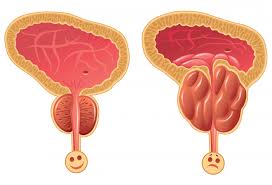As men grow older, they are likely to experience certain health issues due to their body aging. BPH, or Benign Prostatic Hyperplasia, is one such condition resulting from the prostate and its surrounding area expanding.
To properly understand Benign Prostatic Hyperplasia (BPH), it is worth looking at how the prostate grows throughout a man’s life. The prostate will grow during two major stages of a man’s life: one, during puberty, and two, after the age of 25.
During puberty, the prostate will always double in size. Furthermore, after age 25, a man’s prostate will continue growing for most of their life. In Benign Prostatic Hyperplasia specifically, the prostate starts to grow beyond a certain point that it can start causing problems.
A better way to visualize a prostate is by comparing it to the size of a walnut or golf ball in most adult men. However, as men continue to age, the prostate could grow as big as an orange, which can affect the other organs in the body. More specifically, it could add pressure on the urethra, affecting an individual’s ability to empty their bladder effectively.
Symptoms of Benign Prostatic Hyperplasia (BPH)
An enlarged prostate can significantly affect the bladder and its ability to produce, store, and remove urine. Some of the most common symptoms of BPH is having to pass urine often. In certain situations, you may want to pass urine as often as every one or two hours, often at night.
It’s the most common symptom of BPH, but it is not the only one. Other serious symptoms can include:
- Feeling the need to pass urine more than twice every night, also known as Nocturia.
- Having trouble passing urine without straining or pushing.
- A weak flow of urine.
- Suddenly having the urge to pass urine while feeling like you cannot wait.
- Needing to pass urine every one or two hours.
- Feeling like your bladder is full despite passing urine.
The BPH could sometimes become so severe that you cannot pass urine. In this specific case, you must meet with a professional
How Does Benign Prostatic Hyperplasia (BPH) Affect Men?
Besides a general uncomfortable feeling when passing urine, it can significantly disturb sleep cycles and only worsen with age. As it increases in size, it could damage the bladder or cause an infection. If it gets big enough, it can damage the kidneys and lead to blood flowing through the urine.
What Causes Benign Prostatic Hyperplasia (BPH)?
Despite extensive field studies, researchers still need to find out what causes BPH. The common factor among most patients is that they are older men, which is why some have even concluded that hormonal changes contribute to the condition.
Some believe that dropping testosterone levels in the body leads to BPH, as estrogen levels stay the same. Regardless, what factors lead to people developing BPH needs to be clarified.
Are You at a Higher Risk BPH?
While it is not obvious what causes BPH, certain types of men are at a higher risk of developing the condition. These include:
- Men with erectile dysfunction
- Men who are not active
- Men with obesity
- Men with fathers who had BPH
- Men who are over the age of 50

Treatment Options for BPH
Treatment will often differ depending on the severity of the issue, which is why there is no one specific treatment option. The most common treatments include:
- Invasive surgery
- Less invasive surgery
- Prescription or OTC drugs
- Active surveillance
Benign Prostatic Hyperplasia (BPH): Conclusion
At Fifth Avenue Urology, Dr. Yaniv Larish has the skill, experience, and technology to effectively treat BPH.
Call today to schedule a consultation.
FIFTH AVENUE UROLOGY
DR. YANIV LARISH
5 East 83rd Street
New York, NY 10028
212-675-3186

